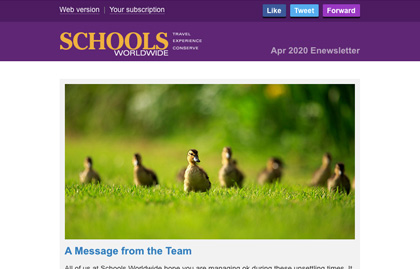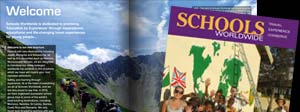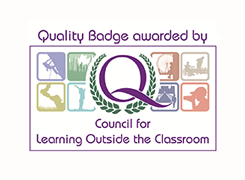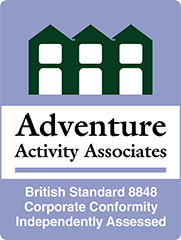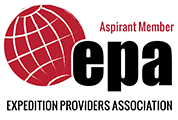The foundation to a safe and successful trip relies in its planning and we will spend many months researching and planning each part of a trip, not only to ensure that it meets your requirements and needs, but importantly, to ensure that it is safe.
-
Safety Compliant
We are delighted to hold the LOtC (Learning Outside the Classroom) Quality Badge.
This is a national accreditation recognising organisations that provide good quality educational experiences and manage risk effectively. Supported by the majority of Local Authority Outdoor Education Advisers, the LOtC Quality Badge makes it easier for anyone organising educational visits to gain approval and provides assurance that their chosen destination has met six nationally recognised quality indicators. See more information on their website: https://www.lotc.org.uk/lotc-accreditations/lotc-quality-badge/We have also been assessed for compliancy to British Standard 8848 which recognises that Schools Worldwide’s operational and safety management processes meet the industry requirements for overseas school trips, fieldwork, expeditions and activities.
Both of these standards are important as they each provide comprehensive standards that are designed to ensure that providers acknowledge the responsibilities involved with operating overseas expeditions and are able to follow current safety advice and good practices.
-
Off-Site Safety Management
Each member of staff involved with planning our itineraries have been trained in Level 3 Certificate in Off-site Safety Management. Our itinerary information and advice is taken from our own country experiences and we undertake reconnaissance visits to any new and existing destinations to ensure that our in-country suppliers remain reliable and operate inline with our policies.
-
Foreign and Commonwealth Offices
FCO travel advice is monitored and incorporated into our Risk Assessments and we register all itineraries and group members with the British Embassy mission overseas, in advance of each group’s departure.
-
Risks and Hazards
An essential part of the research for any trip is endeavouring to identify the associated hazards and making an assessment of the risk that they pose, in order install appropriate measures to lower the risk to an acceptable level of safety.
Each itinerary and activity that we plan undergoes a thorough risk assessment that incorporates general travel risks as well as those associated with a specific itinerary.
The Schools Worldwide Summary Risk Assessment provides a broad, yet comprehensive reference and guide to the general hazards associated with overseas travel.
The Schools Worldwide Country Risk Assessment focuses on assessing the hazards that we have identified within a particular to a country.
Detailed trekking and project forms each contain a Hazard Awareness section, forewarning leaders of particular hazards to be aware of at given points of their itinerary.
A Risk Evaluation Table allows for unidentified hazards (that normally arise out of unforeseen circumstances) to be accurately assessed ‘in situ’ - assisting leaders in making a strong decision while also considering our guidelines.
An essential source of additional information that helps us identify hazards and review and update our risk assessments, are the Leader Reports and our Teacher and Student Feedback questionnaires which we receive at the end of a trip. The Leader Reports are one of the main sources for updating the technical, operational and logistical elements of our trips as they provide a detailed account of an itinerary, whilst teacher and student feedback provides us with valuable information regarding the accuracy of their documentation, the relevance of their pre-trip advice, and the quality of their entire experience. These important feedback resources allow us to review the safety of our trips, update our documentation, and identify areas where we need to improve our services.


